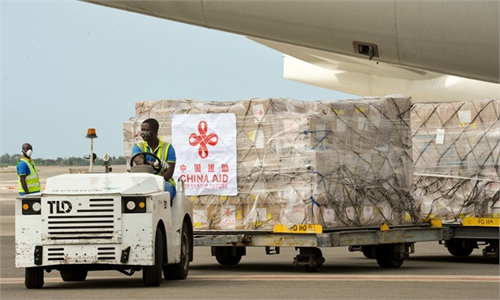
debt Photo: VCG
A Chinese official from China’s foreign aid agency on Thursday refuted recent false remarks made by some US officials who attack and smear China's foreign aid policy.
Luo Zhaohui, Chairman of the China International Development Cooperation Agency (CIDCA), refuted assaults by US officials on China’s foreign aid approach, who accuse Beijing of not being transparent and responsive in the current food crisis and debt relief for poor countries.
During an international development cooperation forum, jointly organized by the Ministry of Commerce and the CIDCA on Thursday, Luo said that China’s foreign aid policy attaches no political strings and helps recipient countries build up their self-development capacity while the US tends to offer "empty promises" and interferes in domestic affairs of other countries.
For example, since the outbreak of COVID-19, China has carried out the largest emergency humanitarian assistance since the founding of the country and provided the largest amount of medical supplies and vaccines to the world, Luo said.
China has also been providing large amounts of food aid to foreign countries through both bilateral and multilateral channels. China is the developing country that provides the most financial assistance, sends the most experts and carries out the most projects under the South–South cooperation (SSC) of the Food and Agriculture Organization (FAO)'s Food Security Framework, Luo added.
China has also actively responded to the G20 Debt Service Suspension Initiative (DSSI), suspending debt service payments worth over $1.3 billion, accounting for nearly 30 percent of the G20’s total debt service suspension as the largest contributor in DSSI, Luo said.
In contrast, the US foreign aid policy has been like a "roller coaster" with unpredictable changes and ups and downs, Luo said.
The US never hides its intension to use aid as a tool for its own interests and to openly interfere in the internal affairs of other countries, Luo said.
The US foreign assistance efforts in recent years, such as the Partnership for Global Infrastructure and Investment (PGII) and the Indo-Pacific Economic Framework for Prosperity (IPEF), are difficult to be implemented and are "empty promises", Luo said.
For example, the PGII, which pledged to raise $600 billion, seemingly offered a huge funding. But there is no timeline for implementation or start date. Considering the US political elections, it is anything but a game of playing numbers, Luo said.
China does not want to pick a fight with the US on international development assistance and is ready to explore bilateral cooperation with the US in areas such as climate change, public health, humanitarian assistance and anti-corruption, Luo said.
“But, since the US has attacked China without cause, we have to fight back to set the record straight,” Luo said.
Global Times

